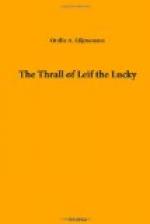The cloud rested on Sigurd’s sunny face for the rest of the evening. Thorhild, enchanted at the tribute to her idolized son, plied the stranger with every attention; and Kark himself, for all his foxy eyes, removed the gilded helm from the smooth black locks without a thought to try whether or no they were indigenous to the scalp from which they sprang,—but Sigurd’s brow did not lighten.
As they put a final polish upon their shields and hung them for the last time upon the wall behind their seats, Rolf said to him with a searching glance: “It is bidden from me why you look so black, comrade. If it were not for the drawback of old Eric at the steering-oar, certainly every circumstance would be as favorable as could be expected.”
Sigurd arose and pulled his cloak down from its peg with a vicious jerk.
“There are other witless people besides Eric the Red who thrust themselves where they are not wanted,” he retorted grimly. Then, turning abruptly, he strode out into the darkness; and none of the household saw him again until morning.
The sun rose upon a perfect day, warm and bright, with the wind in the right quarter, steady and strong. And as if to make sure that not even one thing should mar so auspicious a beginning, Leif’s luck swept away the only drawback that Rolf had been able to name.
Down in the lane, midway between the foot where it opened upon the shore and the head where it ended at the fence, there lay a bit of a rock. A small stone or a big pebble was all it was, but in the hands of Leif’s luck it took on the importance of a boulder.
When the moment of departure arrived, and the cavalcade poured out of the courtyard gates, with a clanking of armor and a flapping of gorgeous new mantles, warmed by the horns of parting ale that had steamed down their throats, singing and boasting and laughing, and cheered by the rabble that ran alongside, their way down to the shore lay directly over the head of this insignificant pebble. Who would have thought of avoiding it? Yet, though a score of children’s feet danced over it unharmed, and sixty pairs of horses’ hoofs pranced over it unhindered, when Eric reached it his good bay mare stumbled against it and fell, so that her rider was thrown from his saddle and rolled in the dust.
There were no bones broken; he was no more than shaken; he was up before they could reach him; but his face was gray with disappointment, and his frame had shrunk like a withered leaf.
“It is a warning from the gods that I am on the wrong road,” he said hoarsely. “It is a sign that it cannot be my fate to be the discoverer of any other land than the one on which we now live. My luck go with you, my son; but I cannot.”
Before they could remonstrate, he had wheeled his horse and left them, riding with the bent head and drooping shoulders of an old, old man.
A stern sign from Valbrand restrained Leif’s men from venting the cheers they were bursting with; but the looks they darted at their leader, and then at each other, said as plainly as words: “It is his never-failing luck. Why did we ever doubt him? We would follow him into the Sea of Worms and believe that it would end favorably.”




